It might be time to take it easy on the disinfection craze.
A revised guidance issued earlier this month by the CDC (Centers for Disease Control and Prevention) discouraged constantly disinfecting surfaces, calling it merely visual reassurance rather than effective against the spread of COVID-19. The Atlantic and Yahoo called this over-sanitizing “hygiene theatre.”
With this “hygiene theater” term circling around the web, people are beginning to distrust performative visual cues. So, what do they trust? What makes sense – good scents, of course.
The Nose Knows Best
Studies show that COVID-19 transmission via contaminated surfaces is lower than 1 in 10,000. According to Dr. Rochelle Walensky, the CDC director, during a Monday briefing at the White House, “In most situations, cleaning surfaces using soap or detergent, and not disinfecting, is enough to reduce risk.”
So if the uncertainty is in the air, not on surfaces, businesses are turning to scent to provide reassurance. In fact, 89% of people cite odor as a direct indicator of cleanliness. By diffusing scent, businesses can ditch “hygiene theater.” They can follow CDC recommendations of simply using soap & water, and then rely on a fresh clean scent to communicate a sense of safety to customers on an emotional level.
People have stronger connections to scent than any other sense. Research has shown we are 100 times more likely to remember something we smell than something we see, hear, or touch, which can help build trust powerfully and quickly with customers. A Brigham Young University study explored this idea of our sense of smell and trust and found that clean scents in particular can increase the tendency to reciprocate trust.
People Want to Smell Clean Scents
Not only do people naturally trust well scented areas, 63% of consumers are actually looking for fresh and clean scents when they are away from home.
Scent can convey cleanliness without the wasted energy of “hygiene theatre” and better yet, customers will value it more. The largest privately-owned perfume and taste company, Firmenich, released a study citing that 59% of consumers appreciate scent more now than at the start of quarantine. Which means consumers returning to businesses as the economy reopens are going to be seeking fresh scented atmospheres.
Rutgers University released a study that olfactory cues generate more positive feelings toward the brand and enhance recall to a greater extent than pictorial cues. This means that scent creates a stronger connection to a brand experience than “Hygiene Theater.” And at the end of the day, a brand that reassures people that their space is clean, reinforces a positive brand experience that people crave.
Exploring the Scents
 So what scents reassure customers of cleanliness? That depends on cultural preferences. What consumers identify as clean in China differs from preferences in Germany, Chile differs from Australia, etc.
So what scents reassure customers of cleanliness? That depends on cultural preferences. What consumers identify as clean in China differs from preferences in Germany, Chile differs from Australia, etc.
For example, Americans find that citrus notes of lemon, sweet orange, and clementine invigorate the senses and convey a sense of clean. In the same breath, hints of mint, pine, lavender, and eucalyptus enhance a sense of wellbeing and freshness.
Hygiene theater no longer helps people feel comfortable and safe on an emotional level, but scent does. With 3.5 more US adults reporting serious mental stress than years prior, it’s important to have scents that convey a sense of wellbeing. According to the Molecules Journal citrus such as Bitter Orange, Bergamot, and Sweet Orange essential oils produced anti-anxiety effects in the clinical studies. These notes can foster relaxing and comfortable environments, while decreasing COVID-19 anxiety.
It’s the curtain call for “hygiene theater” and time for a better way to reassure people. Scent is the perfect way to alleviate fears and make people feel safe and secure in any space while building a long-lasting trust.
Cited Sources:
The Nobel Prize in Physiology or MEDICINE 2004. (n.d.). Retrieved April 15, 2021, from https://www.nobelprize.org/prizes/medicine/2004/summary/
Liljenquist, K., Zhong, C. B., & Galinsky, A. D. (2010). The Smell of Virtue. Psychological Science, 21(3), 381–383. https://doi.org/10.1177/0956797610361426
Lwin, M. O. (2012, May 1). Scenting movie theatre commercials: The impact of scent and pictures on brand evaluations and ad recall. Wiley Online Library. https://onlinelibrary.wiley.com/doi/abs/10.1002/cb.1368
Sousa, D. P. (2015, October 14). A Systematic Review of the Anxiolytic-Like Effects of Essential Oils in Animal Models. PubMed. https://pubmed.ncbi.nlm.nih.gov/26473822/

